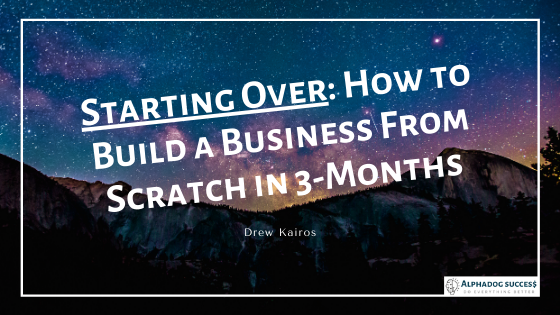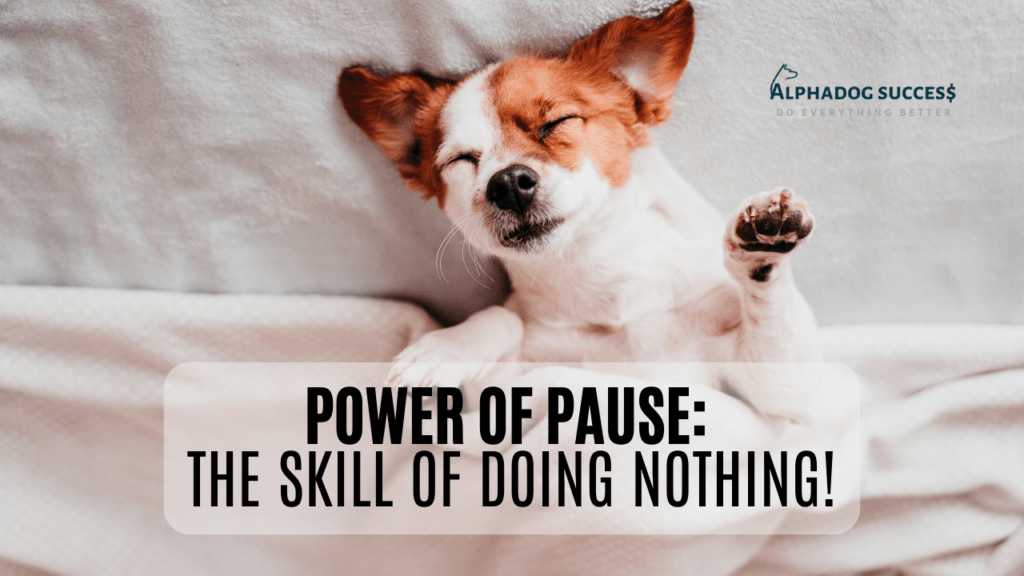How To Start Over & Build A Business From Scratch In 3-Months
Someone asked me what I would do if I had to start a business from scratch in 3 months (90-days). And that got me thinking, if I could take the experience I have and use it to start over from scratch… How would I do it? When I say starting over, I mean it. In this hypothetical I wouldn’t have my mailing list. I wouldn’t have organic traffic, a following, name recognition – none of that. Just my experience as to what works and what doesn’t and the drive to make it happen. Now let’s say that my life depends on me having a full-time income at the end of those 3 months. No pressure there, right?It sounds unrealistic, but a lot of people find themselves in a remarkably similar situation – make more money or else… Or else they’re in trouble, or else the bills go unpaid, or else they’re facing losing their home, or… worse. So, with that in mind, here’s what I would do: I would stop looking for magic ‘make money online’ products, strategies and ideas. There is no secret combo of tricks and buttons to make money. It’s not a printing press – It’s a free market. It may sound counter-intuitive, but in that free market the way to make money is to stop focusing on the money. Simply make yourself indispensable to people who need your solution to their problem. That’s the best way to start a business. Do that and the money will follow. When you’re focused on providing solutions, you no longer be distracted by ‘Shiny Object Syndrome’ that steals your time and your money. Now, I’m not saying all programs are bad. In fact, many of the “how-to” and “step-by-step” trainings are useful as building blocks to the larger puzzle. But that’s usually all they are – they’re puzzle pieces – not full-blown businesses. So, I would start with the outcome first. What is my market? Will I offer a product or a service? What solution can I provide that people will gladly pay for? What’s THE ONE BIG BENEFIT I can provide to my customers? What is my goal (How will I know when I’ve “made it?”) Clarity is key here. You must know where you are going and how you plan on getting there. I don’t mean that you need to have all the specific tactics worked out. I’m talking about the big picture. Think of your business as a GPS. You must know exactly where you are and exactly where you want to end up; plus your chosen method of transportation, in order for it to work properly. This is the starting point of everything that will come next. Next, I would build my website. Odds are it’s going to be a blog. Now, I’m not going to spend a ton of time on setting this up because I only have 3 months to start a business and generate an income. I’ll spend an hour maximum choosing the URL, I’ll get the hosting, I’ll choose a simple, streamlined theme, I’ll get the autoresponder and I’ll be ready to get started. Yes, it takes money to get started. Not a lot, but some. You’re making an investment into your future. And if you think spending a couple of hundred dollars to set up your internet business is somehow a lot of money, consider the alternative: Spending at least that much each month just to drive to and from a job, or spending tens or hundreds of thousands for a brick and mortar business. Time to create content for that blog. But this isn’t about running a blog, it’s about running a business. The blog is just a tool to get the business done. So, here’s what I would do: Look at the big benefit I deliver, and then write down all the stumbling blocks people encounter trying to get that big benefit. Then pick out 3 of these and write detailed posts on how to overcome those barriers. Then repurpose those posts into videos (for YouTube or Facebook) and podcasts, or some type of lead magnet/incentive to get people to join my list. Notice I’m only creating 3 pieces of great content initially, not 300. And I’m repurposing those in multiple ways. Some folks spend years trying to get everything exactly right, but in this hypothetical, I’ve only got 3 months, so forget perfection and just get it done. Don’t get carried away with content creation either. Keep it simple to start, there will be plenty of time to expand later on. The blog posts should be highly focused on getting my prospects to take the next step, which is likely going to be a free consultation. Think about the format of a successful sales funnel that drive people to take a specific action. It’s not very easy to sell a $300 a month coaching program or a $1,000 website optimization package online. Especially if you are under a time constraint. But its typically much easier and faster if you can talk on the phone or in a meeting first. Next, I would offer a service or coaching. Do you know why? Because it’s the quickest way to make real money. Offering products is great, but it takes time to create the products and more time to build the lists to promote that product to. When your list is small, it’s best to focus on services or coaching because it’s the fastest way to start a business that generates a profit. Most people are already experts at something. And to be an expert you just have to have lived through and overcome a specific problem. Get people on a free call, help them solve a problem, and invite them to participate in your coaching program where you will share what is actually holding them back and how to overcome that based on your personal experience. In its simplest form, we are simply sharing our personal knowledge. Now, I’d focus on getting as many people on the phone as I can, because I know two
How To Start Over & Build A Business From Scratch In 3-Months Read More »




